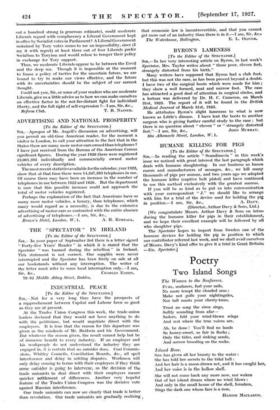INDUSTRIAL PEACE
[To the Editor of the SPECTATOR.] Sin,—Not for a very long time have the prospects of a rapprochement between Capital and Labour been so good as they are at present.
At the Trades Union Congress this week, the trade-union leaders declared that they would not have anything to do with the politicians, but would negotiate direct with the employers. It is true that the reason for this departure was given as the misdeeds of Mr. Baldwin and his Government. But whatever the reason given, the result cannot help but be of immense benefit to every industry. If an employer and his workpeople do not understand the industry they are engaged in, it is certain that no outsider does. Coal Commis- sions, Whitley Councils, Conciliation Boards, &c., all spell interference and delay in settling disputes. Workmen will only delay coming to terms with their employers if they think some outsider is going to intervene, so the decision of the trade unionists to deal direct with their employers means quicker settlement of differences. Another very hopeful feature of the Trades Union Congress was the decisive vote against Russian interference.
Our trade unionists can now see clearly that trade is better than revolution. Our trade unionists, are gradually realizing
that economic law is incontrovertible, and that you cannot get more out of an industry than there is in it.—I am, Sir, &c.•














































 Previous page
Previous page